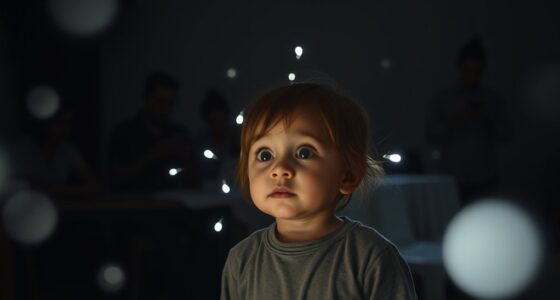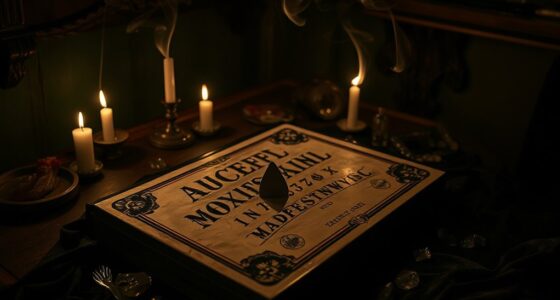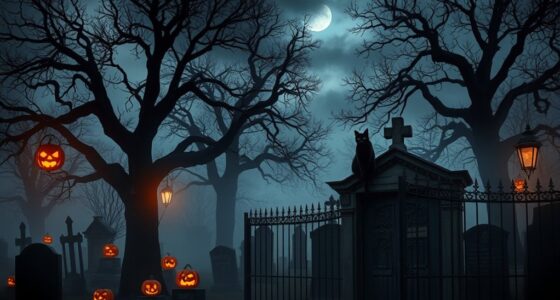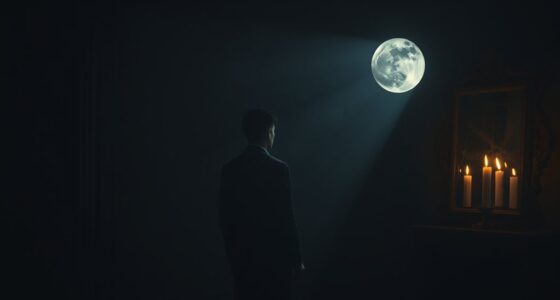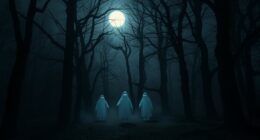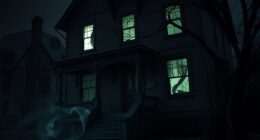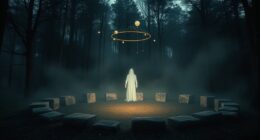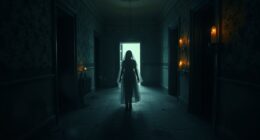Paranormal activity involves events and phenomena that go beyond scientific explanation. This includes experiences like ghost sightings, unexplained noises, and supernatural occurrences that many people have reported. Factors like cultural beliefs and psychological influences shape how you perceive these experiences. Notably, a significant portion of society still embraces these phenomena despite skepticism from the scientific community. If you’re curious about the different types of experiences and interpretations related to the paranormal, there’s more to uncover.
Key Takeaways
- Paranormal activity refers to events that defy scientific explanation, including ghost sightings and supernatural occurrences.
- Psychological factors, such as suggestion and cultural narratives, significantly influence perceptions of paranormal experiences.
- Historical beliefs in the paranormal are shaped by societal fears and hopes, reflecting the psychological state of communities.
- Modern research has increased interest in unidentified aerial phenomena (UAPs), leading to government investigations and a shift toward scientific exploration.
- Paranormal narratives are prevalent in popular culture, driving interest in ghost hunting and creating unique community identities through tourism.
Definition of Paranormal Activity
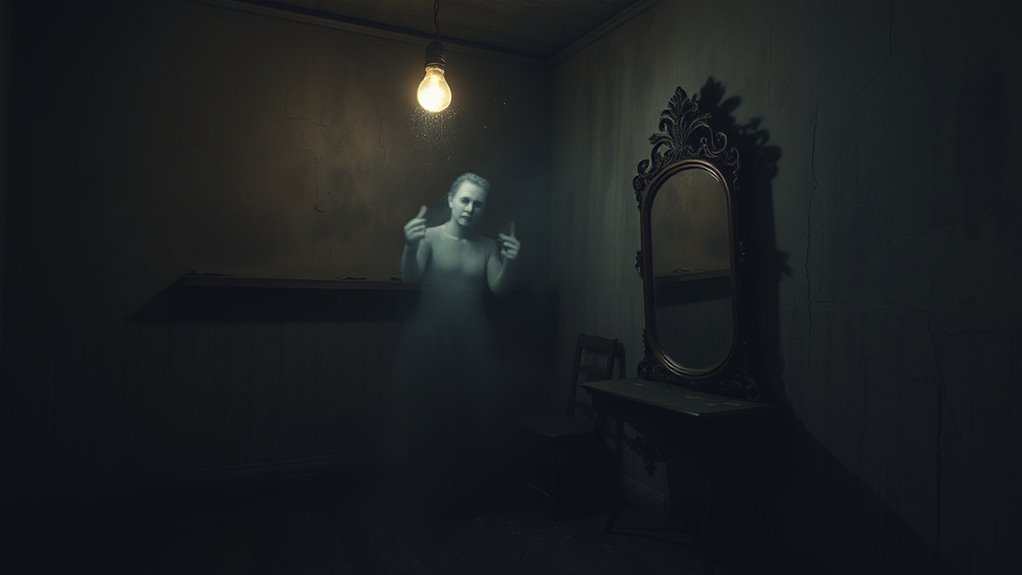
Paranormal activity encompasses events that defy scientific explanation, capturing our curiosity and imagination. This term refers to phenomena that lie beyond normal scientific understanding, involving strange forces like ghost sightings or unexplained noises.
Derived from the prefix “para,” meaning beyond, and “normal,” it highlights occurrences that challenge our conventional views. You might find it intriguing that, in Britain alone, over 11,000 reports of paranormal activity have been documented, reflecting significant public interest.
Many people, around three-quarters of Americans, admit to believing in the paranormal, despite the lack of empirical evidence. This fascination with ghostly encounters, psychic abilities, and UFOs persists, inviting you to explore the mysteries that lie just outside our comprehension.
Common Paranormal Experiences
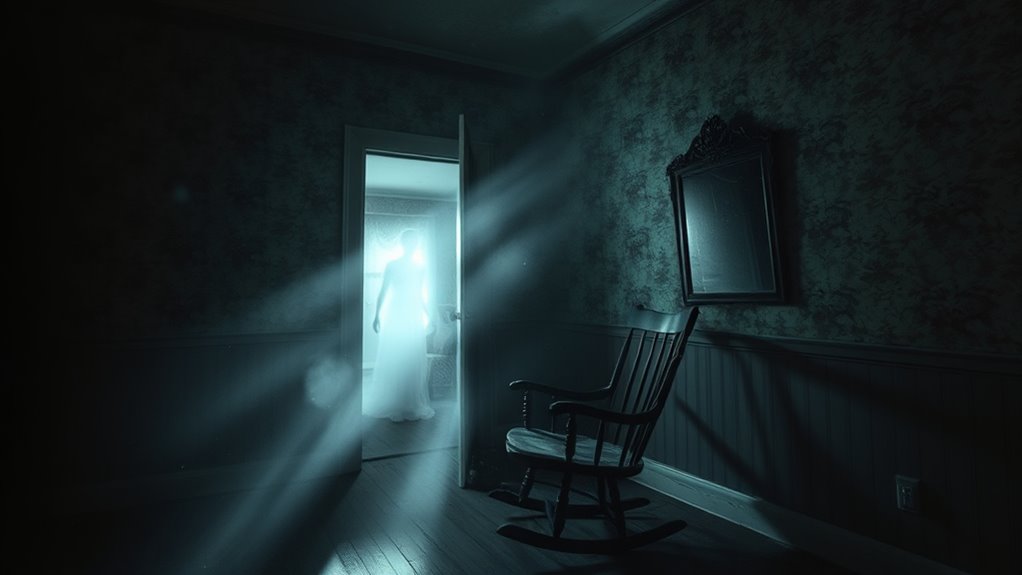
When you think about common paranormal experiences, ghost sightings often come to mind, with many claiming to have seen a spirit at least once.
You might also find stories of psychic abilities and UFO encounters intriguing, as they challenge our understanding of reality.
These phenomena spark curiosity and debate, making you wonder what’s truly out there.
Ghost Sightings and Encounters
Have you ever felt a chill run down your spine in an old building or caught a glimpse of something out of the corner of your eye? You’re not alone.
Ghost sightings rank among the most frequently reported paranormal experiences, with nearly one in five Americans claiming they’ve seen a ghost. These encounters often happen in locations tied to tragic stories or historical events, where people report feelings of coldness, unexplained noises, and sightings of shadowy figures.
Ghost hunting teams use tools like EMF detectors to capture evidence of this elusive activity.
However, many ghost sightings can also be attributed to psychological factors, including the power of suggestion and cultural narratives that shape our beliefs about the supernatural.
Psychic Abilities and Premonitions
Experiences with ghost sightings often open the door to another domain of paranormal phenomena: psychic abilities and premonitions. You might hear about people claiming extrasensory perception (ESP), which includes telepathy, clairvoyance, and psychokinesis.
Many report having premonitions—intuitive feelings or vivid dreams that later come true. While research in parapsychology attempts to investigate these claims scientifically, it often faces skepticism due to inconsistent evidence.
Some self-proclaimed psychics use cold reading techniques, creating an illusion of psychic abilities through educated guesses. Your belief in the paranormal may be shaped by cognitive biases, making you remember accurate predictions while overlooking failures.
This persistence of belief keeps the fascination with psychic phenomena alive, drawing you deeper into the mysterious world of the unknown.
UFOs and Alien Abductions
What drives people to report encounters with UFOs and alien abductions? You might wonder if it’s the thrill of the unknown or a genuine belief in extraterrestrial life.
UFO sightings are documented worldwide, with thousands of accounts fueling the study of ufology. Recent declassified military videos of unidentified aerial phenomena (UAP) have spurred formal investigations and heightened scrutiny.
Many individuals claim they’ve experienced alien abductions, describing chilling encounters aboard spacecraft and unsettling medical examinations. These reports often reflect societal fears and historical contexts, shaping public perception.
While the scientific community remains skeptical, ongoing research into unicellular life in our Solar System keeps the search for extraterrestrial existence alive. Your curiosity may just lead you down this fascinating path.
Scientific Explanations for Paranormal Events
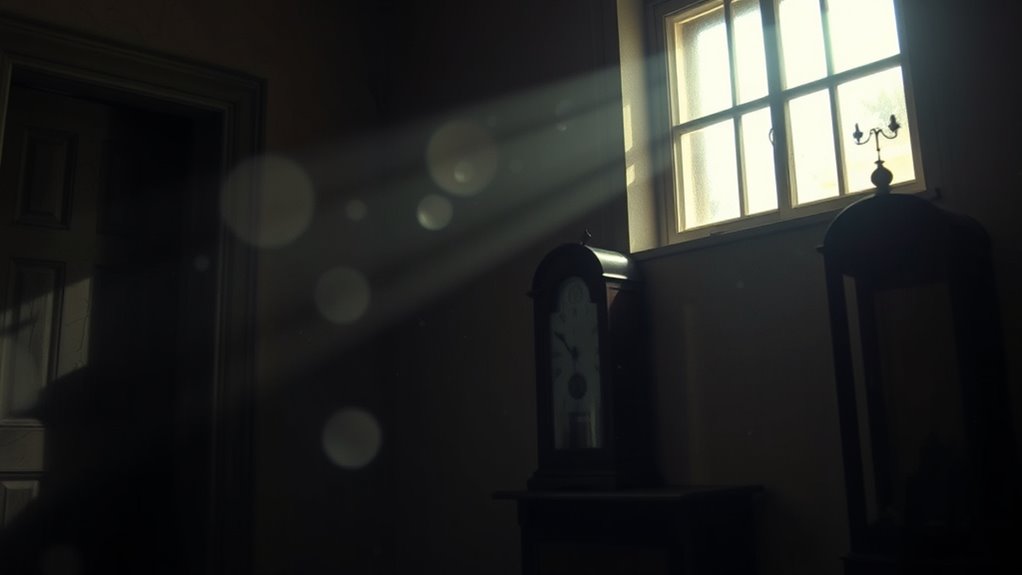
While many people find themselves captivated by tales of the paranormal, scientific explanations often reveal that these experiences can be attributed to more mundane factors.
Human perception isn’t perfect; you might misinterpret sensory information or contextual cues, leading to apparent paranormal subjects. The power of suggestion also plays a significant role—media portrayals can shape your beliefs about what you’ve experienced.
Human perception can easily be influenced, leading to misinterpretations of sensory information and the power of suggestion.
Sleep paralysis can cause vivid hallucinations, making you feel an otherworldly presence. Additionally, self-proclaimed psychics often use psychological techniques like cold reading to appear accurate, relying on general statements.
Even cryptid sightings, like Bigfoot, often stem from misidentifications of known animals rather than evidence of the supernatural, illustrating how science can clarify these phenomena.
Historical Perspectives on the Paranormal

Throughout history, beliefs in the paranormal have shaped cultures and influenced societal norms. You’ll find that these beliefs often reflect the psychological state of communities during tumultuous times.
Consider these key aspects:
- Ancient Civilizations: Ghostly encounters were intertwined with cultural practices and religious rituals.
- Rise of Spiritualism: In the 19th century, many claimed to communicate with the dead, sparking a fascination with mediums and seances.
- Institutional Studies: The Society for Psychical Research, founded in 1882, aimed to scientifically document paranormal events.
- Technological Advances: The 20th-century innovations in photography and audio recording opened new avenues for both belief and skepticism in the scientific community regarding paranormal activity.
These historical perspectives illuminate how deeply the paranormal is woven into human experience.
Modern Research in Paranormal Phenomena

In today’s world, you might notice a surge in scientific investigations into unidentified aerial phenomena (UAPs), especially with recent government interest.
As researchers scrutinize these claims, it’s equally important to critically evaluate so-called paranormal abilities and the techniques behind them.
This balance between exploration and skepticism shapes our understanding of modern paranormal research.
Scientific Investigations of UAPs
As interest in Unidentified Aerial Phenomena (UAPs) surges, scientific investigations into these mysterious sightings are becoming more structured and rigorous.
Recent developments reveal the following:
- Declassified military videos showcase unidentified flying objects (UFOs) performing maneuvers beyond current technology.
- The U.S. government recognizes the need for formal investigations, citing potential national security implications.
- NASA’s dedicated study marks a significant shift toward scientifically exploring UAPs, moving away from anecdotal evidence.
- Growing calls for scientific research have sparked discussions about extraterrestrial life and its implications for humanity.
These efforts aim to emphasize a rigorous, scientific approach to understanding UAPs, paving the way for a clearer perspective on these unexplained phenomena.
Debunking Paranormal Claims
While many people report paranormal experiences, modern research often reveals that these claims can be explained by psychological and environmental factors.
Debunking these phenomena, experts point to issues like sleep paralysis, which can create hallucinations and a sense of presence. Investigations into ghost sightings frequently attribute experiences to electromagnetic fields or infrasound, causing unease.
Additionally, when it comes to unidentified flying objects (UFOs), government studies have shown that many reported sightings involve misidentified aircraft or atmospheric phenomena rather than extraterrestrial encounters.
Critics argue that parapsychology lacks replicable evidence, as numerous claims have been systematically debunked through controlled experiments.
The Role of Belief in Paranormal Activity
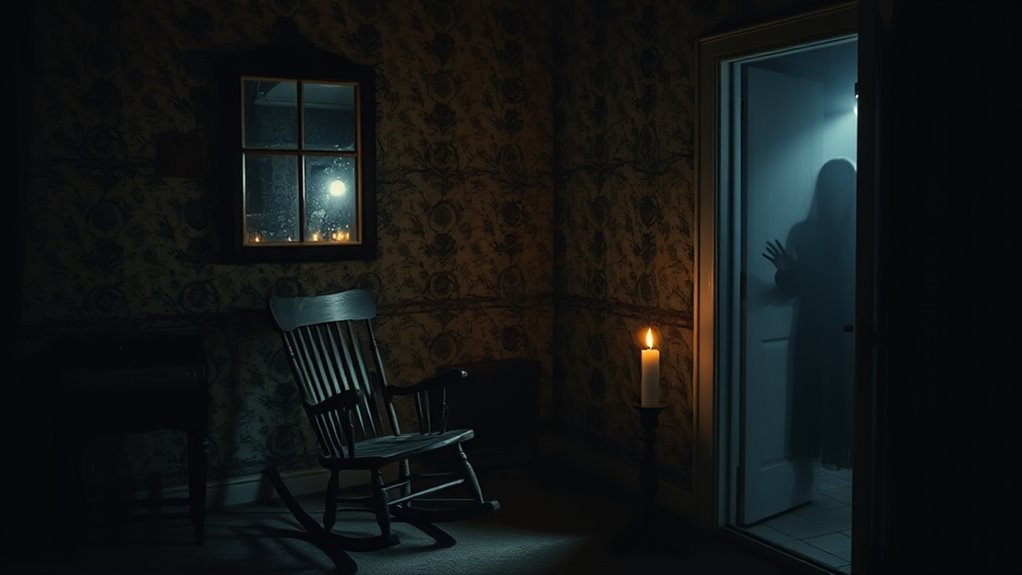
Belief plays an essential role in shaping our perceptions of paranormal activity, influencing how we interpret experiences and events. When you consider the widespread acceptance of the paranormal, it’s clear that belief shapes your understanding.
Here are some key factors to keep in mind:
- About three-quarters of Americans hold beliefs in the paranormal, indicating cultural acceptance.
- Nearly one in five Americans claim to have seen a ghost, showing personal connections to these experiences.
- Influential figures like Winston Churchill and Arthur Conan Doyle expressed beliefs in the supernatural.
- Expecting spooky events can trigger imaginative thinking, leading to interpretations of ambiguous situations as paranormal.
Your belief in the paranormal can even provide solace during difficult times, offering meaning in an often harsh reality.
Cultural Impact of Paranormal Narratives
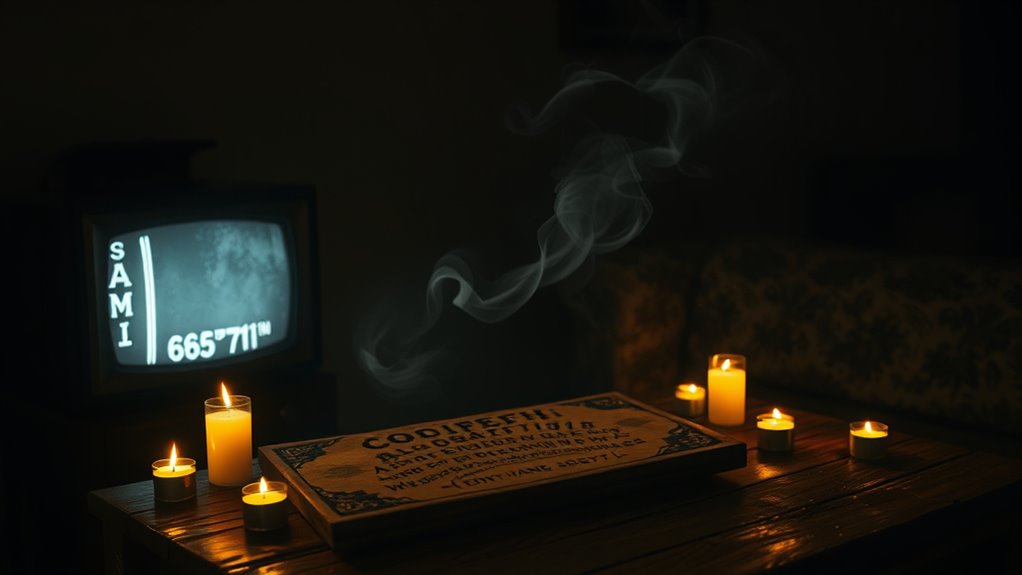
Paranormal narratives have woven themselves into the fabric of popular culture, shaping how you and others perceive the unknown. From movies like “Paranormal Activity” to reality TV shows, these stories explore ghosts, UFOs, and supernatural phenomena, enchanting audiences and sparking conversations.
With about three-quarters of Americans believing in some form of paranormal activity, there’s a deep cultural fascination that challenges scientific skepticism. This belief often reflects societal fears and hopes, influencing folklore and traditions.
As people believe in paranormal abilities, many engage in ghost hunting and paranormal investigations, further fueling interest. Some towns even market themselves as “haunted” destinations, tapping into the allure of the supernatural to attract tourists and create unique community identities.
Frequently Asked Questions
What Is the Meaning of Paranormal Activity?
Paranormal activity refers to events or phenomena that defy scientific explanation. You might encounter ghost sightings, unexplained noises, or other strange occurrences that challenge your understanding of reality.
This term combines “para,” meaning beyond, and “normal,” indicating that such experiences lie outside accepted scientific laws. Many people, including a significant portion of the population, believe in these unexplained events, which fuels ongoing interest and investigation into the mysteries they present.
What Counts as Paranormal Activity?
Imagine walking through an old, creaky house, feeling a chill run down your spine as you hear whispers in the dark.
That’s what counts as paranormal activity—experiences like ghost sightings, unexplained noises, or objects moving on their own.
You might encounter reports of hauntings or strange lights in the sky.
Even psychological factors play a role, as your mind can trick you into believing you’ve witnessed the unexplainable.
What Happens in Paranormal Activity?
In “Paranormal Activity,” you witness a couple, Katie and Micah, face escalating supernatural events in their home.
As Micah records their experiences, strange occurrences intensify, including Katie entering trance-like states and suffering physical marks.
A psychic warns them about a demon feeding off their negativity.
Tension builds until a violent confrontation leads to Micah’s death and Katie’s possession, culminating in her eerie grin at the camera, marking her transformation into something darker.
What Is Paranormal Activity Based On?
When you think about what paranormal activity is based on, consider how our minds can play tricks on us. People often attribute unexplained events to supernatural forces, like ghosts or spirits.
These beliefs arise from personal experiences, cultural tales, and historical anecdotes, despite a lack of scientific proof. Psychological factors, like cognitive biases, can also distort perceptions.
Ultimately, shared beliefs within communities further fuel these mysterious phenomena, making them part of our cultural narrative.
Conclusion
In exploring paranormal activity, you’ve journeyed through a domain where the unexplained meets the imagination. While many experiences seem out of this world, remember the adage, “Seeing is believing,” but belief often shapes what we see. Whether you find comfort in science or thrill in the unknown, the fascination with the paranormal reflects our deepest curiosities and fears. Embrace the mystery, and who knows what new insights you might discover about the world around you.


